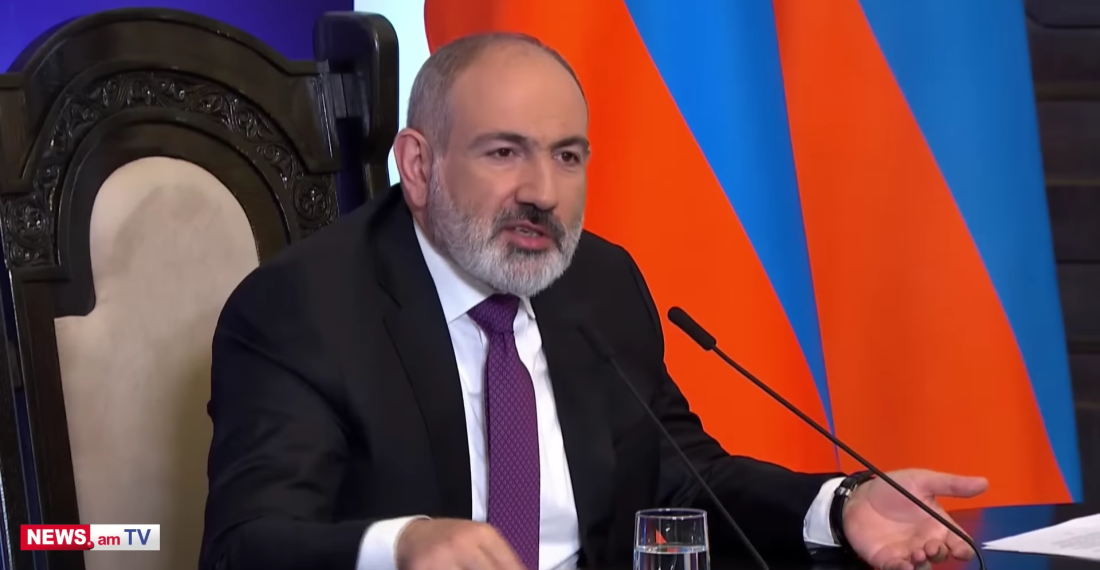The Armenian Prime Minister Nikol Pashinyan gave a lengthy press conference on Monday (22 May) in which he discussed a wide range of aspects of the ongoing Armenia-Azerbaijan peace process. This included progress on a peace treaty, the question of the mutual recognition of Armenia and Azerbaijan's territorial integrity, and border delimitation processes.
Prime Minister Pashinyan gave his press conference to some five dozen media representatives at the main government building in Yerevan. His last press conference took place on 14 March.
Armenia agrees with logic of mutual recognition of territorial integrity, and Baku-Stepanakert dialogue
Pashinyan began by confirming that "intense negotiations" on a "peace and establishment of relations" treaty between Armenia and Azerbaijan are underway, adding that he wants to reach an agreement "as soon as possible".
The international community's perception of the negotiations is that Armenia and Azerbaijan should, without reservations, recognise each other's territorial integrity of 29,800 square kilometers and 86,600 square kilometers, respectively, said Pashinyan. He added that a dialogue between Stepanakert and Baku should take place on the issue of the "rights and security of Nagorno-Karabakh Armenians".
"We agree with this logic and conduct the negotiations with this logic, emphasising that the international mechanisms for guaranteeing the Stepanakert-Baku dialogue are extremely important. At the same time, I am convinced that the strategic guarantee of ensuring Armenia’s security is peace, which is possible by normalising relations with all neighbours. This is not an easy process at all, but I believe it is what our people want and expect," said Pashinyan.
Pashinyan also confirmed that Yerevan has transferred its latest edits on a draft of a peace treaty to Baku. Pashinyan said that Yerevan is waiting for their response, and that he hopes it will "reflect the discussions that took place in Washington, the understanding, the agreements, the progress of the understanding that has been recorded". He believes it was the fourth round of edits, he added.
Mutual recognition of territorial integrity includes recognising Nagorno-Karabakh as part of Azerbaijan, as well as exclaves
When asked by a reporter whether Armenia's recognition of Azerbaijan's area as being 86,600 square kilometres includes Nagorno-Karabakh, Pashinyan confirmed this to be the case.
"No matter what the current government of Armenia says, all the governments of Armenia have recognised the territorial integrity of Azerbaijan. I have made it more concrete, and I find it difficult to imagine more concretely [...] Armenia is ready to recognise the territorial integrity [of Azerbaijan] of 86,600 square kilometers, and in our opinion, Azerbaijan is ready to recognise the territorial integrity of Armenia of 29,800 square kilometers," said Pashinyan.
Prime Minister Pashinyan also addressed the issue of exclaves in the context of recognising Armenia's and Azerbaijan's sovereign territory. There are three Azerbaijani exclaves within the territory of Armenia - one approximately 5km north of Armenia's border with Azerbaijan's Nakhchivan province, and two in the north-east of the country. Meanwhile, there is one Armenian exclave within the territory of Azerbaijan, about 20km north-east of Lake Sevan.
On this subject, Pashinyan confirmed that the four exclaves in question are included in either country's territorial integrity as mentioned above. He cautioned, however, that the practicalities of how these exclaves will be administered in the future is not yet decided.
"There are several options for enclaves," said Pashinyan. "One of them could be the following: the enclave areas on both sides of the [border] line [between Armenia and Azerbaijan] remain under the control of the side where they are located. The other option is that after the signing of the peace treaty, [the Armenian exclave of] Artsvashen will return under the sovereignty of Armenia, [and] the other territories - of Azerbaijan. This is the position from the political point of view, but the legal aspect still needs to be studied."
Washington talks were a critical moment in the Armenia-Azerbaijan peace process, according to Pashinyan
On the talks between the Armenian and Azerbaijani foreign ministers just outside Washington D.C. at the start of May, Pashinyan said that from this moment the sides began communicating with each other more openly, directly, and with a greater mutual understanding than previously.
Pashinyan said that, during the Washington talks, "many nuances have emerged, which may not have been mutually visible to the parties before, or at least not recorded."
"When I say 'mutual understanding,' I mean that I consider the style of conversation to be the biggest feature of the Washington talks, that a lot of it was a direct conversation. At some point, the hidden meanings started to be less, and the conversations were more mutually understandable," he said.
He did caution, however, that this was only his interpretation and that he could not say how Baku perceived the dynamic of the Washington talks.
Pashinyan calls for troop withdrawals to allow for border delimitation work
In the press conference on Monday (22 May), Pashinyan repeated the Armenian position that both sides should withdraw their troops from the Armenia-Azerbaijan border as shown by the maps of the USSR General Staff of 1975. This would allow for border delimitation work to commence, according to Pashinyan.
"Also, I want to emphasise that the simultaneous withdrawal of troops does not in itself predetermine the border delimitation work. That is a separate process, this is just about ensuring the stability of the border situation. However, we also believe that the 1975 map can and should be the basis for further border delimitation work, too, because it implies the agreements reached in Prague on 6 October 2022, regarding carrying out border delimitation based on the Alma Ata declaration [of 1991]," said Pashinyan.
source: commonspace.eu with news.am and agencies
photo: news.am



